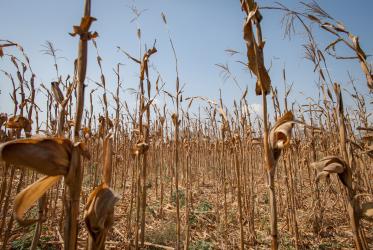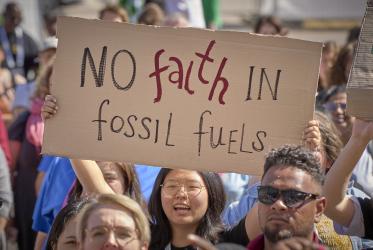Geneva, 14 September 2009
Your Excellency,
The World Council of Churches has been following climate change negotiations since the late 1980s and the creation of the UNFCCC. It is with deep concern we observe the lack of progress in the present climate talks under the convention, and we are therefore following with interest outcomes of climate talks in other international fora.
We understand that you are invited to attend the next session of the Greenland Dialogue, initiated by the Danish government, to promote climate change negotiations leading up to COP15. We are happy to note that the dialogue so far has been taken forward in a good and constructive spirit and we hope that the meeting in New York will be fruitful.
The World Council of Churches is a fellowship of churches with members from around the world. Our deep concern for the most vulnerable countries and peoples compel us to raise some concerns for those attending the Greenland Dialogue.
- Any initiative taken to promote progress in global climate change negotiations is strongly needed. However, we want to stress the importance of linking back to the UNFCCC process, to ensure that decisions are taken within the UN where all parties have a voice and the possibility of influencing the process. We are especially concerned about the voice of the most vulnerable developing countries. These are the countries most affected by the impact of climate change, but with least influence in the political arena. We are aware that the Greenland Dialogue includes parties from both Annex 1 and non-Annex 1, as well as parties coming from the AOSIS and the LDC group. However, the majority of countries still stand outside the dialogue and progress made in New York can therefore not be shifted to UNFCCC without a broader discussion within the UNFCCC framework.
- As an ecumenical family we call for the inclusion of an equity dimension in any forthcoming Copenhagen agreement. Equity is crucial to ensure possibilities for development and economic progress in all countries. We believe that any effort for a sharing mechanism in a forthcoming agreement should be based on the concepts of capacity and historic responsibility. A development threshold ensuring that the poorest people have a right to development under future commitment periods of a global climate change regime is also critical.
- Finance is a key area that needs addressing in the current climate change negotiations. Without a predictable, adequate and a sustainable financial mechanism, any agreement will lack resources for implementation. Considering the urgent need for funds, not only for the future but also for the immediate needs for adaptation in many vulnerable countries, clear commitments are needed from the Annex 1 countries.
We hope that the crucial talks in New York, in the Greenland Dialogue and in the UN General Assembly, will be fruitful and that you can bring the outcome with you back to the negotiations within the UNFCCC.
Yours sincerely,
Rev. Dr Samuel Kobia
WCC general secretary


